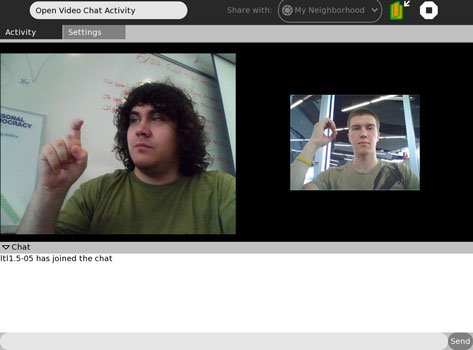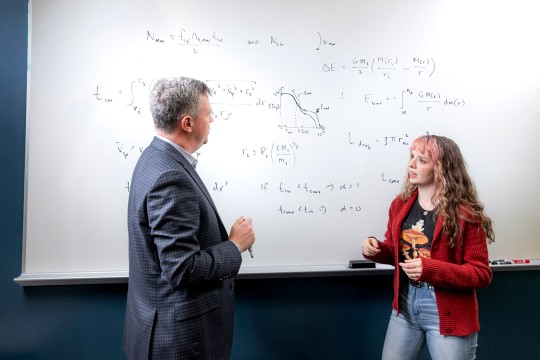Video Chat Program to Facilitate Global Deaf Communication
One Laptop Per Child program to debut at an NTID sponsored symposium June 21-23
Open Video Chat, a program designed by RIT students for the One Laptop Per Child computers, is designed to improve communication between deaf people around the world—particularly in Third World countries.
Rochester Institute of Technology students are set to unveil a new video chat program that will enable deaf children across the world—even those in Third World countries—to communicate with one another through their connected laptops.
The program, called Open Video Chat, is designed for use on One Laptop Per Child computers. One Laptop Per Child is a global initiative that seeks to provide low cost, rugged, connected laptops to children across the world. One Laptop Per Child users wouldn’t typically have access to other video chat systems.
Open Video Chat’s left-hand window shows the party who has received the call and would be signing to the caller. The right-hand window serves as a reference for the caller, which displays the image of how they would appear to the other party. The bottom portion of the screen allows for text-based chat, in the event that one of the parties does not sign.
The program was developed by students who are involved in RIT’s Lab for Technological Literacy’s Free and Open Source Software initiative (FOSS@RIT). Remy DeCausemaker, an alumni fellow in RIT’s Center for Student Innovation, led co-op students Justin Lewis, Fran Rogers and Taylor Rose to create the program.
Open Video Chat will officially debut during the Technology and Deaf Education International Symposium, which will be held at RIT’s National Technical Institute for the Deaf June 21-23. The team will give a presentation at 3 p.m. June 22 in the Lyndon B. Johnson Building.
The effort began last winter when Stephen Jacobs, associate professor of interactive games and media at RIT, demonstrated the One Laptop Per Child computer to the staff of PEN-International and the Center for Access Technology at NTID. PEN-International offered to fund the development of Open Video Chat.
“PEN-International is conducting an analysis of the requirements for bilingual-bicultural deaf education programs in the southeast Asia. Part of this analysis is focusing on technology to support such programs, particularly in providing students with computer-based systems that provide clear video and texting displays that are critical for computer-based communication for deaf users,” says William Clymer, interim director of PEN-International. “The features of the Open Video Chat program, when used on the One Laptop Per Child XO 1.5 computer, offers the potential for high quality and low cost solutions for our target population.”
Jacobs is pleased that his students were able to meet PEN-International’s needs.
“The team did an incredible job, as evidenced by the acceptance of their paper into the Technology and Deaf Education International Symposium and the invitation to demonstrate the program to conference attendees throughout the event,” says Jacobs.
The program, while still in an alpha version, can be downloaded for One Laptop Per Child XO users at the sugarlabs website. It will continue to be developed throughout the summer. For more information on the Free and Open Source Software at RIT initiative, contact Jacobs at sj@mail.rit.edu or foss.rit.edu.












